

Caffeine Effects. Coffee (caffeine) and its Effects in the Human Body. Effects of Caffeine What caffeine does to the body There is no requirement of caffeine in the human diet for the body to function properly.
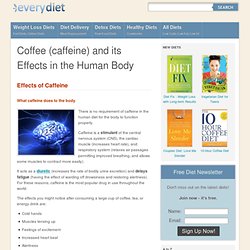
Caffeine is a stimulant of the central nervous system (CNS), the cardiac muscle (increases heart rate), and respiratory system (relaxes air passages permitting improved breathing, and allows some muscles to contract more easily). It acts as a diuretic (increases the rate of bodily urine excretion) and delays fatigue (having the effect of warding off drowsiness and restoring alertness). For these reasons, caffeine is the most popular drug in use throughout the world. The effects you might notice after consuming a large cup of coffee, tea, or energy drink are: Cold handsMuscles tensing upFeelings of excitementIncreased heart beatAlertnessSinuses clearing These effects are heightened if the person doesn’t normally consume caffeine or if a person has been on a break from having caffeine daily.
Do Theophylline and Theobromine have the same effects? 17 Day Diet. Does Caffeine Affect The Body's Ability To Absorb Iron? Caffeinated beverages can decrease iron absorption.
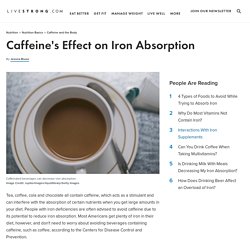
Image Credit: Jupiterimages/liquidlibrary/Getty Images Tea, coffee, cola and chocolate all contain caffeine, which acts as a stimulant and can interfere with the absorption of certain nutrients when you get large amounts in your diet. People with iron deficiencies are often advised to avoid caffeine due to its potential to reduce iron absorption. Most Americans get plenty of iron in their diet, however, and don't need to worry about avoiding beverages containing caffeine, such as coffee, according to the Centers for Disease Control and Prevention. How Fast Is Caffeine Absorbed By The Body? Caffeine is a mind-altering drug common in foods and beverages.
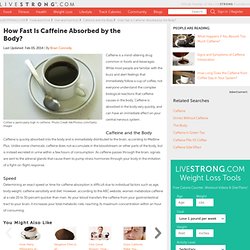
While most people are familiar with the buzz and alert feelings that immediately follow a cup of coffee, not everyone understand the complex biological reactions that caffeine causes in the body. Caffeine is absorbed in the body very quickly, and can have an immediate effect on your central nervous system. Caffeine is quickly absorbed into the body and is immediately distributed to the brain, according to Medline Plus. Unlike some chemicals, caffeine does not accumulate in the bloodstream or other parts of the body, but is instead excreted in urine within a few hours of consumption. As caffeine passes through the brain, signals are sent to the adrenal glands that cause them to pump stress hormones through your body in the imitation of a fight-or-flight response. Chronic coffee and caffeine ingestion effects on the cognitive function and antioxidant system of rat brains 10.1016/j.pbb.2011.06.010 : Pharmacology Biochemistry and Behavior.
Open Access Abstract.
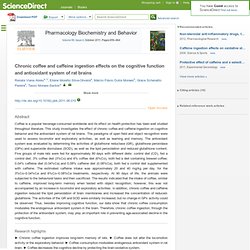
Caffeine and opening the eyes have additiv... [Clin Neurophysiol. 2011. The American Journal of Psychiatry. FOCUS. Go Ask Alice!: Does caffeine raise blood pressure? Dear Alice, Does caffeine raise your blood pressure?
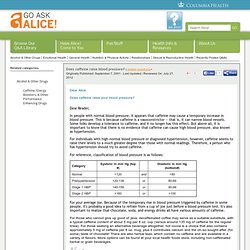
Dear Reader, In people with normal blood pressure, it appears that caffeine may cause a temporary increase in blood pressure. This is becasue caffeine is a vasoconstrictor — that is, it can narrow blood vessels. Some folks develop a tolerance to caffeine, and it no longer has this effect. For individuals with high-normal blood pressure or diagnosed hypertension, however, caffeine seems to raise their levels to a much greater degree than those with normal readings.
For reference, classification of blood pressure is as follows: For your average joe, Because of the temporary rise in blood pressure triggered by caffeine in some people, it's probably a good idea to refrain from a cup of joe just before a blood pressure test. For those who cannot give up good ol' java, decaffeinated coffee may serve as a suitable substitute, with a typical caffeine content of about 5 mg per 8 oz. cup (versus around 135 mg of caffeine for the regular brew). Russell, Morgan. Duke Researchers Finds That Moderate Caffeine Use Boosts Blood Pressure, Potential For Heart Disease. From universities, journals, and other organizations Date: May 29, 1998 Source: Duke University Medical Center Summary:
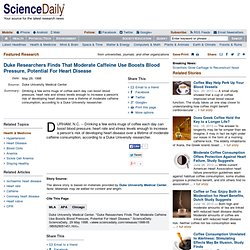
QSpace at Queen's University: Influence of Caffeine on Exercising Muscle Blood Flow and Exercise Tolerance in Type II Diabetes. Timing of blood pressure measurement relate... [Ann Pharmacother. 2008. Caffeine Limits Blood Flow To Heart Muscle During Exercise. In healthy volunteers, the equivalent of two cups of coffee reduced the body's ability to boost blood flow to the heart muscle in response to exercise, and the effect was stronger when the participants were in a chamber simulating high altitude, according to a new study in the Jan. 17, 2006, issue of the Journal of the American College of Cardiology.
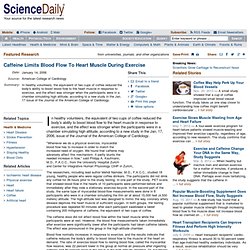
"Whenever we do a physical exercise, myocardial blood flow has to increase in order to match the increased need of oxygen. We found that caffeine may adversely affect this mechanism. It partly blunts the needed increase in flow," said Philipp A. Kaufmann, M.D., F.A.C.C., from the University Hospital Zurich and Center for Integrative Human Physiology CIHP in Zurich,. The researchers, including lead author Mehdi Namdar, M.D., F.A.C.C., studied 18 young, healthy people who were regular coffee drinkers. The caffeine dose did not affect blood flow within the heart muscle while the participants were at rest. Caffeine-inducible ATP r... [Naunyn Schmiedebergs Arch Pharmacol. 2008. Effect of caffeine ingestion on alve... [Aviat Space Environ Med. 1991. Quantitative study on the non-covalent interactions between ATP and caffeine, theophylline and theobromine in aqueous solution 10.1016/j.fluid.2011.06.006 : Fluid Phase Equilibria.
Abstract An investigation is hereby presented on the possible formation of a stacking (π–π) complex between adenosine-5′-triphosphate (ATP) and three xanthines (L), namely caffeine (Cf), theophylline (Tp) and theobromine (Tb), at different ionic strengths (0.05 ≤ I/mol L−1 ≤ 1) in NaCl(aq) and temperature (T = 283.15, 298.15 and 313.15 K), by using magnetic resonance spectroscopy 1H NMR.
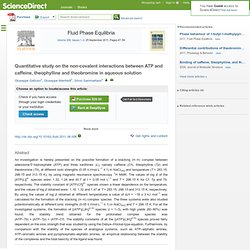
Caffeine ingestion, affect and perceived exertion during prolonged cycling 10.1016/j.appet.2011.05.304 : Appetite. Abstract Caffeine's metabolic and performance effects have been widely reported.
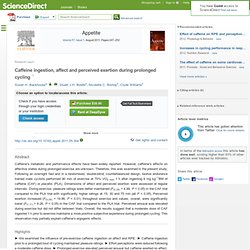
However, caffeine's effects on affective states during prolonged exercise are unknown. Therefore, this was examined in the present study. Following an overnight fast and in a randomised, double-blind, counterbalanced design, twelve endurance trained male cyclists performed 90 min of exercise at 70% VO2 max 1 h after ingesting 6 mg kg−1BM of caffeine (CAF) or placebo (PLA).